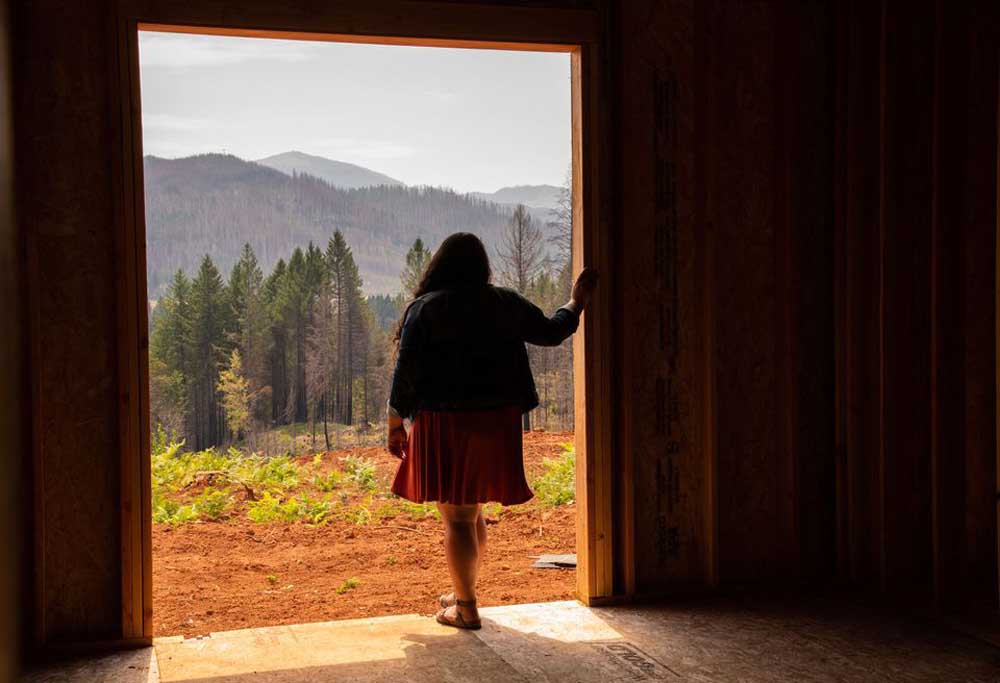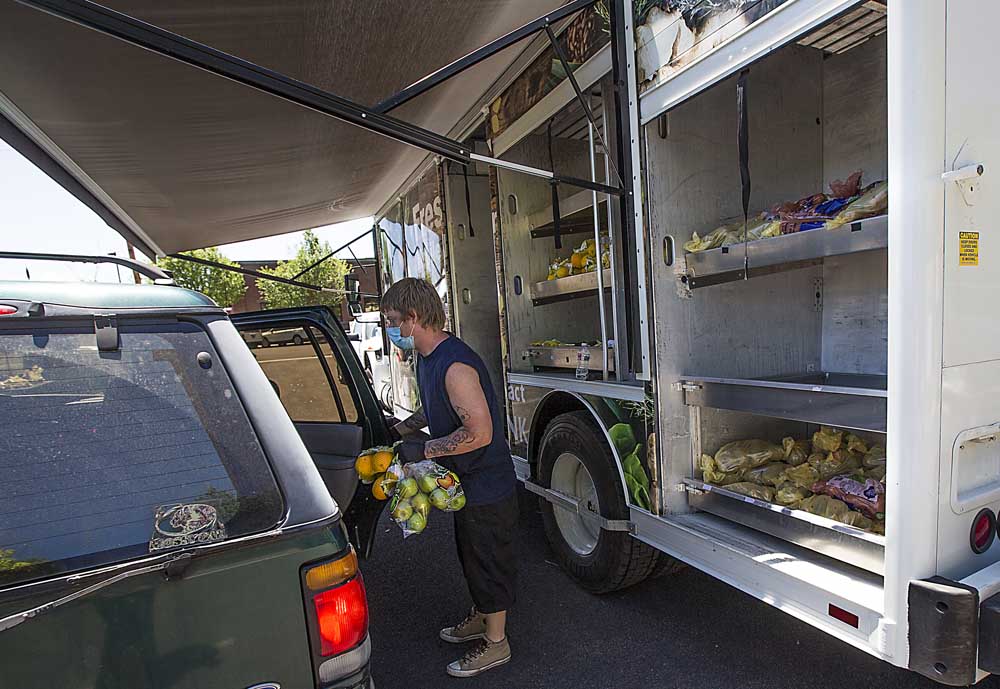‘Everyone is in crisis’: McKenzie River Valley, centered on its school, rebuilds after a year of grief since Holiday Farm Fire
Published 5:00 am Monday, September 6, 2021

- Xochilt Diaz looks at the view from what will soon be a sliding glass door in her master bedroom. The Diaz home is scheduled to be finished in late September, but the house is still a shell with bare wooden walls. “It’s a lot of emotion coming to this place,” says Diaz. “It's a joy because I see what it could be and I see our future home coming together, and other times it’s overwhelming sadness because there’s still so much left to go.”
FINN ROCK — Lorinda Marcy has lived in Oregon’s McKenzie River Valley since 1990. Although her house burned down a year ago, it’s still home.
The McKenzie River Community School secretary lost her home in the Holiday Farm Fire that burned through the valley on Labor Day in 2020. She — along with the rest of her community — has been slowly rebuilding since.
“I always land on my feet,” said Marcy, whose grandchildren are being raised in the area. “I just have to figure out what that looks like now.”
Many share that mentality as the community continues to reshape itself one year after the tragedy. Members take pride in what they have accomplished to this point.
About a quarter of the students and a third of the staff at the McKenzie River school lost their homes.
The rural school, serving students from kindergarten through 12th grade in a district that stretches nearly 40 miles from east to west, has almost 200 students and 50 staff members. And it is the center of the community in the absence of a local government, Superintendent Lane Tompkins said. At one point, 153 students were displaced.
The fire struck the day before the school year was slated to begin. The disaster delayed the opening by three weeks.
Although much of the school district’s computer equipment was fried and its school bus destroyed, the school building, which includes district offices, was spared.
“We didn’t lose something that a lot of people in the community have a lot of real feelings and affection for,” said Tompkins. The building’s survival allowed the school to anchor the community recovery, he said.
‘Makes me emotional’
The district’s leaders navigated two crises — the COVID-19 pandemic and the wildfire, said Tompkins, who lives in Eugene, beyond the Holiday Farm Fire’s reach. They had to weigh the risk of returning to in-person school, which would have given students a stable location with internet, and potential exposure to the virus. They opted to remain exclusively in distance learning until March.
The student body was about 215 at the start of last school year, but will drop to about 185 this fall, Tompkins said. Some families moved away from the area rather than trying to rebuild.
Sarah and Jeremiah Mackenzie, who lived in the unincorporated community of Vida, were separated from their kids for months after the fire. While their house didn’t burn, smoke damage made it uninhabitable, so their daughters Gracie, 11, and Meridah, 6, spent most of the school year in Ohio with their grandparents.
“It makes me emotional,” Sarah Mackenzie said. “People were like, ‘How could you let your kids go?’ But it was the best thing for them. Keeping them here, living in a hotel, yes, we’re together, but they had a lot more opportunities in Ohio. They had consistency. They had love and support.”
As a member of the Marine Corps, she had lived all over the world, but the McKenzie River Valley community is the only one she has never felt ready to leave, she said. She and her husband are both focused on rebuilding and have a contingency plan for future threats, which helps Sarah sleep each night.
The couple both immediately decided they wanted to help rebuild their community in any capacity they could. Jeremiah started as a volunteer firefighter. Sarah became a teacher’s assistant and substitute preschool teacher at the community school, and she’s studying to become a social worker for the area clinic and school. Sarah was pregnant with now 3-month-old Finnley at the time, though, so working with little kids became tough.
“We want to help out as much as we can,” she said. “We were extremely fortunate to not lose everything, so that fuels us even more.”
A different kind of disaster
The McKenzie district was among the worst affected school districts in Oregon last fall. But officials do not expect it to be the last to suffer deep physical and emotional blows from wildfire.
Fire seasons in Oregon are becoming longer as the region becomes hotter, said Erica Fleishman, director of the Oregon Climate Change Research Institute at Oregon State University. Growth in human population also means more people are living in places that are fire prone.
The Holiday Farm Fire was unusual in that the heat, dryness and wind were not unprecedented, but the way they came together was, causing extensive damage in a matter of hours.
“All of those things created a very dangerous situation,” she said.
Knowing this, science teacher Nate Day adapted his curriculum. Environmental science is an important part of what he covers as the school’s seventh- to 12th-grade science teacher. But he didn’t want to delve deep into topics such as forestry during the past school year, he said, because the wounds from the fire were too fresh.
Day’s role went beyond teaching, he said. He affirmed that his students and their families would be OK — even when he didn’t know whether that would in fact be true.
“People tend to be more gracious with each other when they understand each other’s pain,” he said.
The start of the school year was strange, Day said. Asking “How are you?” was no longer fitting, and focusing on a curriculum felt wrong. Eventually the routine and human connections started to feel good, but students kept their cameras off during virtual class time and he was sometimes unsure if they were present. “This year was just total and complete trauma,” he said. “Everyone is in crisis.”
The fire came within 6 feet of his house in Vida, but many of his and his girlfriend Melissa Hebin’s valuables were off site and got burned, he said. After they were forced to evacuate, most of the area’s residents spent days not knowing if they had a house to return to. Cell service was out, and people couldn’t enter the area due to damage. In addition to a backpack with a few changes of clothes, Day grabbed his dad’s guitar from 1970s Germany on his way out the door.
“At some point, it’s safer to just mourn it all and just prepare — your house is gone, your school is gone, maybe people you know are dead,” he said.
‘All I could do is pray’
Josh and Tia Cloke knew they’d have to evacuate their home in Blue River when they recognized a voice on the police scanner app. The world around them was red while they packed and drove away, not knowing what they would return to, if anything.
“All I could do is pray,” Josh said.
When they arrived at a hotel for the first night, Tia realized she had left behind the only memory of her late triplet children. She didn’t sleep knowing their footprints and hospital tags might have burned.
The couple, their three surviving kids — Mason, Noah and Addison — and two dogs spent the past year in an RV, first at a camp and then on their property, which was once surrounded by luscious trees, while their house is finalized. The house, which they had lived in for 15 months, wasn’t fully burned, but fire went underneath it, Josh said. The box with the triplets’ memorabilia was saved.
The Clokes moved to Oregon from Iowa 3½ years ago and fell in love with the area, Josh said, so they want to see it recover. In addition to managing their house and their three kids’ school years, both took on responsibilities to help make that happen.
Josh became president of the local water, park and sanitary districts. He wants to build the systems stronger than they were before.
As the nurse practitioner for the Orchid Health McKenzie River Clinic, Tia supported the community through COVID-19 and heat-caused issues, she said. Several patients left critical medications in their homes, which were burned down.
“There is part of it too that you look at it and go, ‘OK, if you don’t step up, who will?’” Tia said. “‘And will it ever happen?’”
The Clokes gave their kids grace when it came to school, Tia said. In addition to rebuilding after the fire, the whole family contracted COVID-19. If they needed to take a day off for mental health, they did, she said.
Time to recover
McKenzie River Community School kindergarten teacher Xochilt Diaz said she also gave her students — and herself — extra permission and understanding throughout the school year. Kids would casually share that their Legos melted or that their parents were sad, and she was similarly suffering.
“People are really, really hurting right now,” she said.
Her house, located on an isolated hill in the valley, completely burned down. The property was given as a gift to her partner, Spencer Bryson, by his father, who died in 2020. They had looked forward to eventually building another home on the land, a process that was advanced by several years due to the fire. Dry tree trunks serve as remnants of the green forest that used to surround them.
When the school year eventually started, Diaz did not feel ready. She told her superintendent that she didn’t even have a pen, much less materials or the liveliness it takes to teach kindergarten. The corner where she created her virtual classroom was the first area set up in their temporary apartment.
“It was really hard,” she said. “I had to psych up every day to try and be the teacher those kids deserved.”
Returning to teaching in person in March, although challenging because of COVID-19 precautions, felt healing, Diaz said. While she’s ready to leave behind many parts of the past year, having more connection with parents due to the shared tragedy is something she’ll take with her into coming school years.
“I’ve always been a teacher that wants to know where my kids are at before I expect them to do things, but keeping in mind that we’ve all suffered this trauma this year and everyone is coming back in different ways will be super important,” she said.
Tomkins, the superintendent, said he hopes the hardship and experience McKenzie went through can serve as a resource to other districts. Every heat wave or dry spell in the state worries him and others because they know what it could lead to, especially as dry seasons become longer and heat conditions worsen. But what they learned and the sense of community they felt is something that they can pass on.
“In those moments it didn’t matter who you voted for or who you prayed to,” he said. “It was just people helping people, and that was really affirming for the condition of humanity.”






